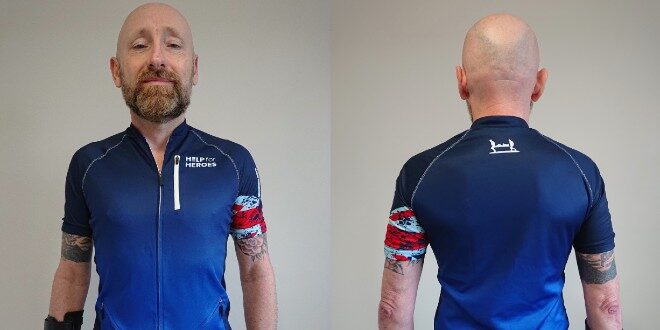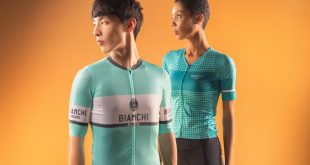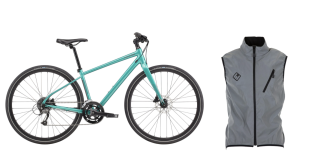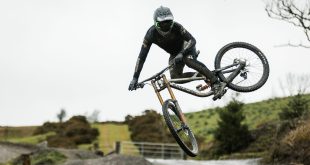Help for Heroes has launched its first recumbent cycle jersey, developed in conjunction with David Rose, a former RAF aircraft engineer from Downham Market, Norfolk.
Many of the wounded veterans supported by the charity cycle on recumbent trikes and hand bikes as part of their recovery, so Help for Heroes recognised the need for a jersey designed specifically for their needs and brought in Rose to help create the ideal product.
Rose explained: “Prior to the launch of the Recumbent Cycle Jersey, I had to use a standard one which, when you’re sitting in a chair, means no useful pockets, moisture-wicking materials in the wrong place and a fit that just doesn’t work.”
With Rose’s input, the fit of the jersey has been developed to suit the cycling position with the collar cut higher at the back and lower at the front. Priced at £40, it features two front pockets, angled for easier access, with zip closures to keep contents safe.
The back panel is made from lightweight mesh fabric for improved comfort in the seat and is made from sports performance fabric to accelerate moisture away from the skin, while the mesh panels help to maintain body temperature.
Rose (pictured modelling the jersey) consulted with fellow riders during the design phase who also helped in testing the product and he believes recumbent cyclists will be very happy with the design.
He added: “We have addressed everything that is wrong with a standard cycling jersey for recumbent cycling. This means I now have a place for my phone, snacks, keys, and all manner of items, whilst remaining comfortable with far-improved moisture control. For me, it’s a game changer.”
Rose, 51, experienced a number of injuries during his 31 years of service for the RAF, which left him with his right arm and hand partially paralysed owing to nerve damage in his shoulder. He requires strong medication to deal with Complex Regional Pain Syndrome and his mental health suffered due to the impact of his injuries and loss of his military career.
When he got on a trike it was one of the first things he found he could do without too much pain. It gave him the same buzz as upright cycling and re-introduced an amount of risk that he could control.
Rose will be modelling his Recumbent Cycling Jersey throughout June as he has also signed up to Help for Heroes’ new cycling challenge, Heroes Ride 200. For this, participants are being asked to ride 200 miles between 1st-30th June on any bike, anywhere, to raise vital funds to support wounded veterans and their families.
He will be taking part in Heroes Ride 200 as one of a team of six wounded veterans, called the Heroes Team, who all use cycling to help overcome a variety of mental and physical health challenges – from PTSD and spinal injuries to arm paralysis and chronic illnesses.
They hope that by joining as a team they can highlight the positive impact of cycling on physical and mental wellbeing, while promoting the inclusivity of Heroes Ride 200 as a cycling event.
Between now and the end of June, Rose and his fellow Heroes Team members will be highlighting their stories, training tips and progress on social media which will be shared on Help for Heroes’ own social media channels. They even hope they will be able to meet up for a finale to the challenge on 30th June if COVID restrictions allow.
Whilst 200 miles is a challenging, but far from impossible, distance for most weekend cyclists, it can be a huge individual challenge for many veterans who have been injured or become ill as a result of their time in the Armed Forces.
This is why Heroes Ride 200 is encouraging teams as well as individuals to sign up so that, even if someone only feels able to cycle five miles, they are still contributing and making a difference to the team total.
Hannah Lawton, sports recovery manager at Help for Heroes, added: “Cycling is a great sport for anyone. The Heroes Team embodies the amazing spirit of our cycling veterans and, as their assortment of hand bikes, recumbent trikes and upright bikes show, there is a bike to suit pretty much any impairment, making cycling one of the most adaptive sports there is. This is what has made cycling a core activity in the recovery of many of our veterans.
“With Heroes Ride 200 we hope to encourage many others to join us, whatever their skill or fitness level, and experience all the mental and physical health benefits of being on two wheels – all whilst raising vital funds for wounded and sick veterans.”
97% of Help for Heroes’ income comes from the great British public, but it experienced a 65% loss to its income from events in 2020 due to the pandemic. At the same time, demand for the charity’s services is going up. During the first lockdown, there was a 33% increase in those coming forward for mental health support.
To sign up for Heroes Ride 200 visit heroesride.helpforheroes.org.uk.
Read the May issue of BikeBiz below:
 BikeBiz Bicycle and cycling retail news
BikeBiz Bicycle and cycling retail news




